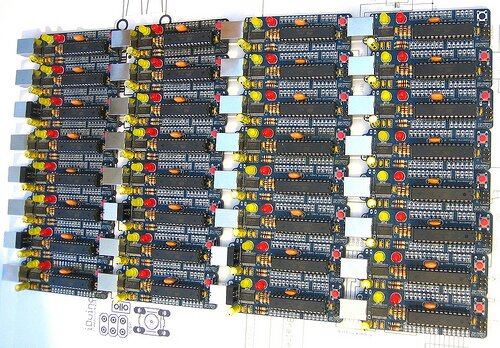Entries from Spiff's Electronics Notebook tagged with 'kit'
Bus Pirate v1 PTH kits on sale (June 26, 2009)
For people who love serial ports, through hole parts, and doing things themselves, we're (or 32% off). The price goes up when we run out of this lot, so now is an excellent time to pick up an excellent development tool for an excellent price.
buspirate hackaday Kit pth Sale store
Posted by spiffed at 11:51 AM | Comments (0)
Freeduino 2009 - a plain through hole modern 'duino (June 16, 2009)
This one's been waiting in the wings for a while. The Freeduino 2009 is a through-hole Arduino clone with Duemilanove level features like auto power-supply switching, reset on upload, and everything else you'd expect.
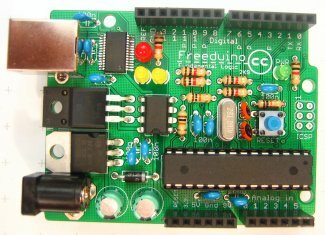
The !
Arduino Atmel Freeduino Kit store
Posted by spiffed at 5:47 PM
Introducing the Spiffie.org Bus Pirate PTH (March 25, 2009)
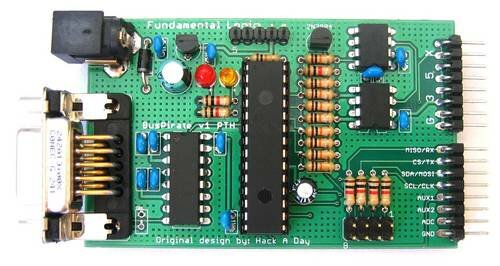
Hack A Day made an awesome prototyping and debugging tool called . The bus pirate can interface with most serial interfaces (SPI, I2C, RS232, JTAG, 1wire, etc) and is controlled by a simple serial terminal. If you have a pc with a serial port and a bus pirate, you can talk to most serial chips.
The latest revisions, though, are surface mount, which isn't so hot if you're just starting out, so we've taken their design and converted to entirely through hole parts with plenty of working space.
Go ahead and check out the Spiffie.org Bus Pirate PTH documentation and the .
When you're ready, , , or grab the sources and build your own.
| Full Kit | Bare PCB |
|---|---|
buspirate hackaday kit pth store through hole
Posted by spiffed at 3:43 PM | Comments (0)
TC64x based fan controllers (March 3, 2009)

Based on microchips TC64x series of chips, these are easy to build, use, and understand temperature sensitive fan controllers.
Checkout their project page or directions, then find them in the store or build your own from the sources.
fan kit microchip SingleSided store
Posted by spiffed at 4:07 PM | Comments (0)
Fading LED default test sketch (February 12, 2009)
For some time now, every Arduino bootloaded ATmega we've shipped has come with a default testing sketch that slowly pulses the LED on and off in a cyclic fashion.
A "fading" sketch using hardware PWM is included in the IDE distribution under Examples→Analog→Fading to fade an LED, but the Pin 13 status LED isn't connected to a hardware PWM pin.
The answer is to abuse the delayMicroseconds call to create crude software PWM. By setting the pin high; delaying; setting the pin off; and delaying for a different period, we can change the brightness simply by altering the delay.
One catch to this approach, is if you use purely the on/off delay to control the PWM speed, you're left with either a very fast fade or an unsettling flashing. Instead we keep the delay between 4 and 250 µs (about 3 to 4kHz) and add an additional loop around each on/off loop to set the fading speed. --You can't set the delayMicroseconds code to 0 or you'll get an unexpectedly long delay.
Finally, we use the serial port to output a rising count, just to ensure the serial port works.
Continue reading "Fading LED default test sketch"
Arduino Atmel Code Freeduino Kit
Posted by spiffed at 11:11 AM
MPGuino V2 Kits (December 1, 2008)
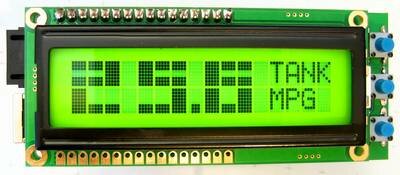
MPGuino v2 kits are now available.
The MPGuino is an Arduino based open source fuel economy computer for most vehicles with electronic fuel injection and a vehicle speed sensor.
There are a limited number of version 1 kits still available for those wishing.
| Full Kit |
|---|
arduino energy freeduino kit store
Posted by spiffed at 12:14 PM | Comments (0)
The ATXSwitch (August 25, 2008)
The ATXSwitch makes it easy to add an additional ATX power supply to virtually any PC. When your primary power supply is turned on, the ATXSwtich automagically enables a secondary supply.
At only 10 parts and a PCB, it's super easy to assemble with the full-colour photo-based directions.
Head over to it's instructions or buy one below.
| Full Kit | Board Only |
|---|---|
atx kit simple kit store
Posted by spiffed at 2:12 PM | Comments (0)
Introducing the StickDuino (August 25, 2008)
Whoa, how did we miss announcing this? The StickDuino is a fully featured Arduino clone (freeduino) that allows you to carry an Arduino compatible tool around in your pocket.
Head over to it's instructions or buy one below.
| Fully Assembled | Board Only |
|---|---|
arduino Atmel freeduino kit store USB
Posted by spiffed at 2:05 PM | Comments (0)
Assembled iDuino Kits (July 31, 2008)
We now carry fully assembled iDuino kits for those who need some but don't want to solder. Because they're a special order for assembly, there's a minimum order of 5 units.
arduino Atmel freeduino kit store
Posted by spiffed at 9:35 PM
Introducing the DuinoStamp (June 26, 2008)
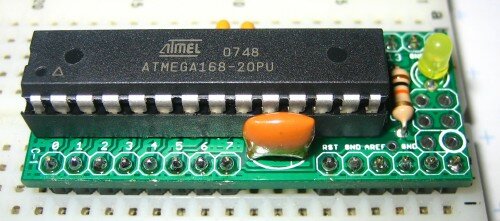
After working in collaboration with Justin Wyatt on his idea for a stamp-sized Freeduino, I'm pleased to introduce the DuinoStamp. It's a convenient breakout board allowing you to easily embed an Arduino compatible environment into your project. The same size as a 34-pin 0.600" DIP, it's easy to incorporate into bread-boards, perf-board, or PCBs. It contains all the components and connections you need, without including costly and large extras.
Head over to it's instructions or buy one below.
| Full Kit | Board Only |
|---|---|
arduino Atmel freeduino kit store
Posted by spiffed at 3:40 PM | Comments (0)
New PCBs and Yellow Soldermask (May 22, 2008)
A panel with 5 fresh new products just arrived from Gold Phoenix.
Firstly a comment on the yellow solder mask: Black, Blue, and Green are my staple solder mask colours, but it's nice to branch out sometimes and I went with a yellow mask for this order. My initial impression is that it looks OK on the copper portions of the board, but the masked bare laminate is unimpressive. While it adds variety to the lineup, it definitely looks cheap compared to even the green mask (which is cheaper) and very cheap compared to a blue or black mask. I'm left with a single-sided paper-laminate feeling.
The new projects are, clockwise from the top left:
- A thermistor based high/low temperate tracker for the -5°c to 30°c range.
- A 555 based high-voltage (48V to 250V) switch-mode boost supply.
- An NCP1400 based 5V step-up controller. I'm not sure if I'll push this design for kitting.
- The 3.3V version of the popular FT232 USB to TTL converter.
- A constant current controller. When hooked between a load and ground, this allows you to set a particular maximum current level regardless of supply voltage or load variances. This is ideal for loading SMPS, LEDs, Laser diodes, etc.
Gold Phoenix kit PCB SolderMask
Posted by spiffed at 12:58 PM | Comments (3)
Build a MaxSerial Freeduino (April 9, 2008)
About
The MaxSerial is a MAX232 based serial board compatible with the Arduino environment.
Buy
I'm pleased to offer these as a kit, bare PCB, and fully assembled. Use the below options to purchase with-out the optional 3.3 volt supply or explore your other options.
| Full Kit | Board Only | Fully Assembled |
|---|---|---|
Continue reading "Build a MaxSerial Freeduino"
Arduino Build Eagle3D Freeduino Howto Kit MAX232 MaxSerial Serial
Posted by spiffed at 2:40 AM
Introducing the USB7 (March 28, 2008)
I'd like to introduce you to my latest idea, the USB7. 6 digits of 7 segment awesomeness all controllable from a USB virtual com port (via AVR-CDC). You send it numbers, it displays them, what could be easier?
The protocol is very simple; the device accepts a string of numbers, '+', '-', '.', space, and upper/lower hex digits (A-E). The device will buffer up to 6 characters to display. When you send a newline or carriage return (0x0A or 0x0D) the display will update with the buffered data. Any other character is thrown away. It is important to remember that decimals take up no character space because they share a digit with the previous number. This means you can't start a string with a '.', you must first send a character (even space) then the '.'.
After the jump I'll set it up to show my download speed using LCD Smartie.
Continue reading "Introducing the USB7"
Atmel Kit LED Serial USB
Posted by spiffed at 9:47 AM | Comments (2)
A max232 Based 'duino (March 8, 2008)
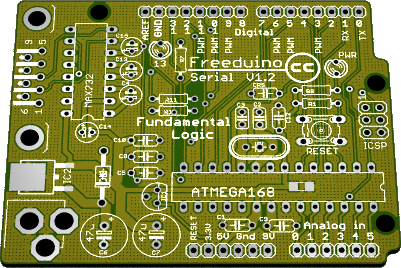
I, and some others it seems, have spotty results talking to the "official" s and their Freeduino counterparts. To that end, I present a max232 based design, complete with Diecimila layout and DTR reset.
Continue reading "A max232 Based 'duino"
Arduino Eagle3D Freeduino Kit MAX232 MaxSerial Serial
Posted by spiffed at 1:14 AM | Comments (0)
555 based SMPS (February 22, 2008)
One of my tasks involved a 105V supply voltage, and therefore a 105V power supply. This simple 555 based switch mode power supply performs nicely around 100 to 300 volts (depending on load) from a 9 to 12 volt supply.
Continue reading "555 based SMPS"
555 HV Kit OnPaper SingleSided SMPS
Posted by spiffed at 4:08 PM | Comments (0)
Repairing a KITSRUS Kit 150 for ICSP (January 29, 2008)
In the beginning, I fell in love with the Kitsrus Kit 150 PIC programmer for it's socketed automatic programming mode. The kit was priced right, supported most of the chips I encounter, and available locally. Over the years, I've ended up with five of them.
Recently, I discovered none of them function for ICSP or 40-pin parts. (Normally I use a JDM2 clone for ICSP, this was the first test of the K150.)
Obviously, some investigation was in order.
Continue reading "Repairing a KITSRUS Kit 150 for ICSP"
Howto Kit KitsRUs PIC Programmer Repair Solder
Posted by spiffed at 8:39 PM | Comments (0)
Single Sided FT232RL USB-Serial Converter (January 25, 2008)
Unsatisfied with everything else, I present the simple, single-sided, breadboardable, FT232RL based USB to TTL Serial converter.
I know you're thinking "But everyone under the sun makes an FT232 kit!", and you're right. But they all suffer from a selection of problems:
- Double sided boards with tiny vias. Not only are these a pain to solder by hand, they also require perfect precision to etch and drill at home.
- 7 million parts butted as close to each other as the pick-and-place can tolerate. I can't assemble these with tweezers.
- Signals and power brought out to a DIL style header. There's simply no effective way to plug a DIL header into a breadboard. It's a functional system for wirewrap, perfboards, and stripboards but so is a DIP style connection. It's not very helpful for custom PCBs either, since I might as well integrate the whole circuit into the board.
- You get the idea.
The answer of course is to design a simple, roomy, single sided board, with a DIP like fit.
Continue reading "Single Sided FT232RL USB-Serial Converter"
Eagle3D FT232 Kit PCB Serial SingleSided SMD USB
Posted by spiffed at 12:27 PM
Serial LCD Controller (June 26, 2005)
makes a number of rather nice serial (and USB based) LCD and VFDs. What they do not make, are inexpensive LCDs. Thankfully, hacking serial onto a cheap parallel LCD is sometimes almost as good.
Continue reading "Serial LCD Controller"
Code Kit LCD PIC Serial SerialLCD
Posted by spiffed at 1:11 PM
A bigger basic H-bridge (April 12, 2005)
We just don't do small. So when it came to choosing stepper motors, I picked nice beefy 2lb bipolar beasts. Driving these has, however, turned into a bit of a problem.
Continue reading "A bigger basic H-bridge"
FET H-Bridge Kit Optoisolator PCB PIC Transistors
Posted by spiffed at 8:20 PM
Feed Subscription
If you use an RSS reader, you can subscribe to a feed of all future entries tagged 'kit'. [What is this?]


